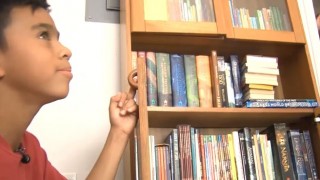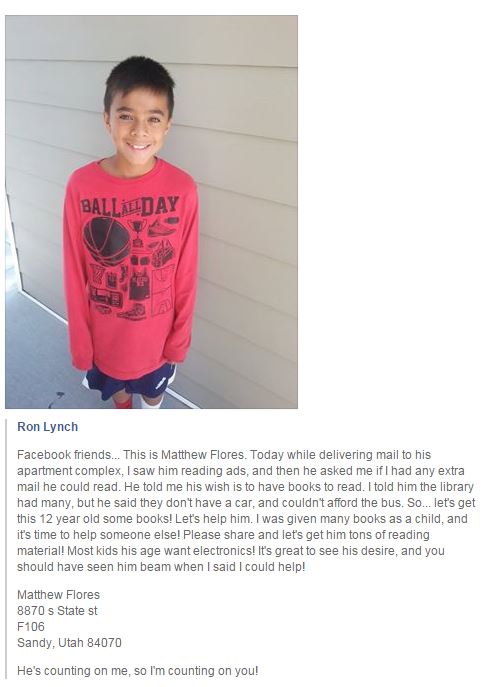
A young boy from Utah has received thousands of books from people around the world after his mailman found out he was reading junk mail in lieu of real literature. Matthew Flores, 12, of Sandy, Utah, told mailman Ron Lynch that the reason he was reading junk mail was that he did not have any books. Flores explained that he also could not visit the library because his family did not have enough money to give him for bus fare or other transportation. He then asked Lynch if Lynch had any extra junk mail to give him to read. Touched by the boy’s story, Lynch went to Facebook for help and posted the following request:
Lynch’s plea for assistance quickly went viral, and soon, people from all over the globe were shipping their books to Flores. Within days, he had hundreds of books, and now, that number has grown into the thousands. He has so many books, he says, that he is going to work with Lynch to begin sending some of them to other children in need. The spirit of sharing has touched Flores, but he says he plans on reading each and every book before paying it forward. “It’s fun and interesting,” he says, “and it gets you smarter.”
Lynch explained that Flores’ story moved him because his own parents instilled a deep love of books in him from an early age. He was also extremely impressed that Flores did not express any interest in electronics or watching t.v. “This kid just wanted to read,” he said.
Reading from real books is greatly advantageous over playing video games, watching television or even reading from electronic screens. The science is solid in this respect, as a large body of research has proven the benefit of paper books over gadgets of all kinds. People who read from real books have better overall comprehension and long term memory, improved sleep, a greater level of empathy, and reduced stress.
Reading from screens nearly guarantees a lack of focus, as links embedded in the text pull the eyes and mind away from the content. This has caused people to stop reading in a linear way. Instead, they tend to read just the first sentence of a piece, then rapidly skim over the rest of the material on the left side of the page only; a manner of reading called an “F” pattern. This F pattern greatly limits the amount of material a person can ingest. Recall of the content from screens, such as a Kindle, for example, has proven to be far inferior to recall after reading an actual book.
Luckily, Flores will not have to worry about a lack of comprehension or memory. He is “super happy” now because he has so much fantastic reading material; real paper books he can delve into. Books continue to flood in from all around the world, including from such far away places as Australia and India. Lynch had originally thought that his Facebook request would generate about 50 to 60 books, mostly from his immediate list of friends and family. Now, through the power of social media, Flores and many other children are going to benefit from Lynch’s kind gesture.

